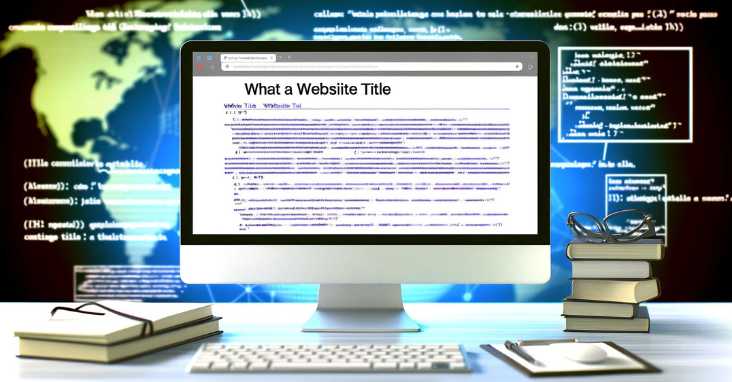What is a website title? A website title is a brief, descriptive text shown in browser tabs and search results, crucial for SEO and user orientation on the web.
A website title is an essential component of any website. It is the name that appears at the top of the browser window and is often used as the clickable link in search engine results. What is a website title? This question is a crucial element in search engine optimization (SEO) and can have a significant impact on a website’s visibility and ranking.

Understanding what is a website title is important for anyone who wants to create or maintain a website. A website title should accurately reflect the content of the website and be concise and easy to read. It should also include relevant keywords to help with SEO. However, crafting a website title is not just about SEO. It is also about creating a title that is user-friendly and visually appealing.
In this article, we will explore the best practices for crafting website titles, by asking what is a website title? We will look at the technical aspects of website titles, and how to optimize website titles for users. We will also discuss the visual representation of website titles and how to analyze and improve website title performance. Additionally, we will cover common mistakes to avoid and answer frequently asked questions about what is a website title. By the end of this article, readers will have a comprehensive understanding of website titles and how to create effective ones.
Key Takeaways
- What is a website title ? Is an essential component of any website and is crucial for SEO and user experience.
- Best practices for crafting website titles include accuracy, conciseness, and the inclusion of relevant keywords.
- Optimizing website titles for users involves creating a title that is visually appealing and user-friendly.
Understanding What Is A Website Title?
Definition and Importance
What is a website title? It is also known as a title tag, is an HTML element that specifies the title of a webpage. It appears in the search engine results pages (SERPs) as the clickable headline for a given webpage. What is a website title is an essential question and component of on-page search engine optimization (SEO) and plays a crucial role in attracting visitors to a website.
The website title is the first thing that a user sees when searching for information on a search engine, and it helps them decide whether a particular website is relevant to their query or not. A well-crafted website title can significantly increase the click-through rate (CTR) of a website, leading to higher traffic and better rankings.
Role in SEO and Search Engine Rankings
Search engines use website titles to understand the content of a webpage and rank it accordingly in the search results. What is a website title, this is an element that accurately describes the content of a webpage, contains relevant keywords, and is compelling to users can improve the website’s visibility and ranking in the search engine results pages.
Including relevant keywords in what is a website title can also help search engines understand the topic of the webpage and rank it for relevant search queries. However, it is essential to avoid keyword stuffing and ensure that the website title reads naturally and is compelling to users.
According to a study by Moz, a leading SEO software provider, what is a website title, this is one of the most critical on-page SEO factors, and optimizing it can have a significant impact on a website’s search engine rankings.
To learn more about what is a website title and how to optimize them for SEO, check out this resource from Moz: Title Tag.
Best Practices for Crafting Website Titles
Crafting what is a website title is a crucial aspect of SEO that can significantly impact a website’s visibility and click-through rate. There are several best practices that website owners and marketers can follow to create effective website titles.
Length and Character Limit
What is a website title, this element should ideally be between 50-60 characters long and should not exceed 70 characters. This is because search engines display only the first 60 characters of a title in search results. It is also essential to avoid using special characters, such as exclamation marks or brackets, as they might be misinterpreted by search engines.
Relevance and Keyword Usage
Website titles should be relevant to the content on the page, and website owners should aim to incorporate the main keyword in the title. However, it is crucial to avoid keyword stuffing, which is the practice of overusing keywords in a title to manipulate search engine rankings. Instead, website owners should aim to use relevant keywords that accurately describe the content on the page.
Brand Incorporation
Incorporating the brand name in the website title can help improve brand recognition and recall. However, it is essential to strike a balance between brand incorporation and keyword usage, as search engines prioritize relevance over brand recognition.
Avoiding Keyword Stuffing
Keyword stuffing is a black hat SEO technique that can result in search engine penalties. Website owners should avoid using the same keyword multiple times in the title or using irrelevant keywords to manipulate search engine rankings.
To summarize, answering the question what is a website title, requires a balance between relevance, keyword usage, and brand incorporation. Website owners should aim to create concise, descriptive titles that accurately reflect the content on the page while avoiding keyword stuffing.
For more information on best practices for crafting website titles, check out this article.
Technical Aspects of Website Titles
HTML Title Tag Structure
The HTML title tag is a vital element of a web page, as it provides a concise and accurate description of the content on the page. The title tag is located within the head section of the HTML code and is usually displayed at the top of the browser window or tab.
The HTML title tag structure is straightforward, consisting of opening and closing tags that enclose the text of the title. The following is an example of the HTML code for a title tag:
<head>
<title>Example Title</title>
</head>
It is important to note that the title tag should not exceed 60 characters in length, as search engines may truncate longer titles. Additionally, the title tag should accurately reflect the content of the page and include relevant keywords to improve search engine optimization.
Integration with Content Management Systems
What is a website title, this question can be managed and edited easily through content management systems (CMS) such as WordPress. The Yoast SEO and All in One SEO plugins for WordPress allow users to optimize the title tag and meta description for each page on their website.
These plugins provide a user-friendly interface that allows users to edit the title tag and meta description directly, as well as providing real-time feedback on the length and keyword usage. This integration with CMS makes it easier for website owners to manage their website titles and improve their search engine rankings.
It is important to note that while these plugins can help improve SEO, the content on the page itself must also be relevant and high-quality to truly benefit from optimized title tags.
For further information on HTML title tags and their importance for SEO, visit Moz’s guide to title tags.
Optimizing Website Titles for Users

Creating Engaging and Compelling Titles
What is a website title? It is often the first thing that users see when they come across a website. It is crucial to create a title that is both engaging and compelling to grab the reader’s attention. An engaging title should be informative and convey the purpose of the page, while a compelling title should persuade the user to click on the page.
To create an engaging and compelling title, it is essential to understand the audience and the content of the page. The title should be relevant to the content and appeal to the target audience. A title that is too generic or vague may not attract the right readers, while a title that is too specific may not be appealing to a broader audience.
Using action words, such as “Discover,” “Explore,” or “Learn,” can make the title more clickable and entice the user to click on the page. Additionally, using emotional words, such as “Amazing,” “Incredible,” or “Unbelievable,” can create a sense of excitement and curiosity.
Improving Click-Through Rates
The click-through rate (CTR) is the percentage of users who click on a link to visit a page. Optimizing what is a website title can improve the CTR and increase the traffic to the website. A higher CTR can also improve the website’s ranking on search engines.
To improve the CTR, it is essential to create a title that stands out from the competition. Using keywords in the title can help the page rank higher on search engines and attract the right audience. However, it is crucial to avoid keyword stuffing and make the title sound natural.
Using numbers and lists can also make the title more appealing and easier to read. For example, “10 Tips for Better Sleep” is more compelling than “Tips for Better Sleep.” Using questions in the title can also create a sense of curiosity and encourage the user to click on the page.
In conclusion, optimizing what is a website title is crucial for improving the user experience and increasing the traffic to the website. By creating engaging and compelling titles and improving the click-through rates, the website can attract the right audience and improve its ranking on search engines.
Here is an external resource that provides more information on how to optimize what is a website title for SEO.
Visual Representation of Website Titles

Website titles are an important aspect of a website’s overall design and functionality. They serve as a visual representation of the website’s content and purpose, and can have a significant impact on user perception and behavior. In this section, we will explore how website titles appear on browser tabs and social media, and how they can affect user engagement and search engine optimization (SEO).
Appearance on Browser Tabs and Social Media
What is a website title? It is typically displayed on the browser tab when a user visits the website. This makes it one of the first things that users see when they visit a website. A well-crafted website title can help users quickly identify the purpose of the website and what they can expect to find on it.
The appearance of website titles on social media platforms such as Facebook and Twitter is also important. When a website is shared on social media, the website title is often used as the default title for the post. This means that what is a website title can have a significant impact on how the website is perceived by social media users.
Impact on User Perception and Behavior
Website titles can have a significant impact on user perception and behavior. A clear and concise website title can help users quickly identify the purpose of the website and what they can expect to find on it. This can lead to increased engagement and a better user experience.
On the other hand, a poorly crafted website title can have the opposite effect. Users may be confused about the purpose of the website, which can lead to frustration and a high bounce rate. This can negatively impact the website’s search engine ranking and overall performance.
In addition to user perception and behavior, what is a website title also play an important role in SEO. The website title is one of the most important on-page SEO factors. It tells search engines what the website is about and helps them understand the content on the page. A well-crafted website title can help improve the website’s search engine ranking and visibility.
To learn more about what is a website title and their impact on SEO, check out this article.
Analyzing and Improving Website Title Performance

What is a website title plays a crucial role in attracting traffic and optimizing search engine results. A well-written title can have a significant impact on a website’s performance, while a poorly written one can lead to a low click-through rate. In this section, we will discuss tools and strategies for analyzing and improving website title performance, as well as steps to rewrite and optimize existing titles.
Tools and Strategies for Analysis
SEO specialists can use various tools to analyze the performance of website titles. One such tool is Google Analytics, which provides insights into the click-through rate and bounce rate of a website’s pages. Other tools, such as Ahrefs and SEMrush, can provide data on keyword rankings and competitor analysis.
When analyzing website title performance, it is essential to consider the impact of the title on the target audience. The title should be relevant, descriptive, and engaging, while also incorporating relevant keywords. It should be able to convey the purpose of the page in a concise and clear manner.
Steps to Rewrite and Optimize Existing Titles
Rewriting and optimizing existing website titles can improve their performance and increase traffic. The following steps can be taken to achieve this:
- Identify pages with poor-performing titles: Use Google Analytics or other tools to identify pages with low click-through rates or high bounce rates.
- Analyze the current titles: Evaluate the current titles and identify areas for improvement. Ensure that the title is relevant, descriptive, and engaging, and incorporates relevant keywords.
- Rewrite the title: Use the identified areas for improvement to rewrite the title. The new title should be concise and clear, while also incorporating relevant keywords.
- Monitor the performance: Monitor the click-through rate and bounce rate of the page to evaluate the impact of the new title. If necessary, make further adjustments to the title.
In conclusion, analyzing and improving website title performance can have a significant impact on a website’s traffic and optimization. By using the right tools and strategies, and following the steps to rewrite and optimize existing titles, SEO specialists can improve the performance of website titles and achieve better search engine rankings. For more information on what is a website title and how to optimise it, visit this article.
Common Mistakes and How to Avoid Them

Examples of Poor Website Title Practices
What is a website title? This component is an essential of any website as it is the first thing that visitors see when they land on the site. Unfortunately, many website owners make mistakes when it comes to creating their website titles, which can negatively impact their search engine rankings and the overall user experience. Here are some examples of poor website title practices to avoid:
- Using a generic title: A generic title such as “Home” or “Welcome” does not provide any information about the website’s content and does not entice visitors to click on the link.
- Using a long title: A title that is too long can be cut off in search engine results, making it harder for visitors to understand what the website is about.
- Using irrelevant keywords: Using irrelevant keywords in the title can mislead visitors and negatively impact the website’s search engine rankings.
- Using all caps: Using all caps in the title can make it hard to read and may come across as unprofessional.
Tips for Maintaining Title Quality and Relevancy
To maintain title quality and relevancy, website owners should consider the following tips:
- Define the website’s purpose: The website title should define the website’s purpose and provide visitors with a clear idea of what to expect.
- Use ultra-specific titles: Using ultra-specific titles can help attract the right visitors and improve the website’s search engine rankings.
- Include numbers: Including numbers in the title can make it more clickable and entice visitors to click on the link.
- Use HTML tags: Using HTML tags such as H1 and H2 can help search engines understand the importance of the title and improve the website’s search engine rankings.
- Write meta titles and descriptions: Writing meta titles and descriptions can help improve the website’s search engine rankings and provide visitors with more information about the website’s content.
Website owners should avoid making the mistakes mentioned above and follow these tips to create a high-quality and relevant website title. For more information on what is a website title and how to craft one effectively, visit Moz’s guide to title tags.
Frequently Asked Questions

How do I differentiate between a website title and an article title?
What is a website title? While an article title is the name of a specific piece of content within the website. The website title is usually found at the top of the homepage and is used to identify the website. On the other hand, an article title is usually found at the top of the page or within the article itself and is used to identify the specific piece of content.
What is a website title in APA formatting?
In APA formatting, the website title should be italicized and capitalized. Only the first letter of the first word and proper nouns should be capitalized. For example, “The New York Times” would be formatted as “The New York Times”.
How is a website title formatted in MLA citations?
In MLA citations, the website title should be italicized and capitalized. Only the first letter of the first word and proper nouns should be capitalized. For example, “The New York Times” would be formatted as “The New York Times”.
What are the guidelines for including a website title in a citation?
When including a website title in a citation, it should be italicized and capitalized according to the citation style being used. Additionally, the website title should be followed by a comma and the date of publication or last update of the website.
Can you provide examples of effective page titles for websites?
Effective page titles for websites should be concise, descriptive, and accurately reflect the content of the page. For example, “10 Tips for Writing Effective Website Titles” would be a good page title for an article about writing website titles.
What are some strategies for choosing an appropriate title for my website?
When choosing a website title, consider the purpose of your website and the audience you are trying to reach. Your website title should be memorable, easy to spell and pronounce, and accurately reflect the content of your website. Additionally, you may want to consider incorporating relevant keywords into your website title to improve search engine optimization.
For more information on what is a website title, visit this resource, which provides guidelines for creating effective website titles.












